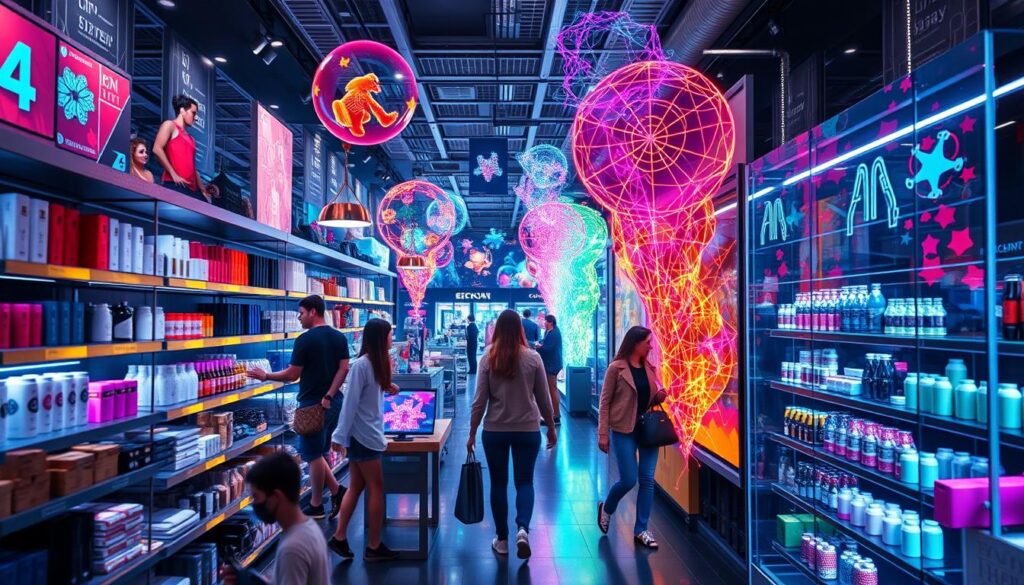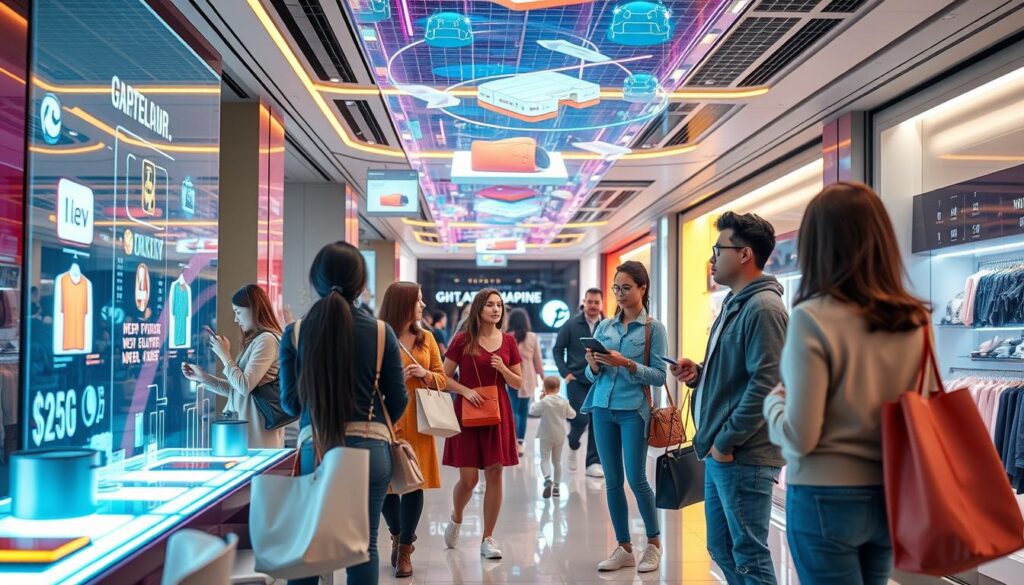Augmented Reality (AR) and Artificial Intelligence (AI) are changing the retail world. They give shoppers unique experiences they’ve never had before. AR lets us add digital info to the real world. AI analyzes and adapts to make shopping personal and enjoyable. Together, they make shopping exciting and draw more customers in.
AR and AI lead the way in making shopping new and better. They meet the desire for personalized shopping experiences. Around 80% of shoppers prefer buying from places that offer personal touches. Personalization can lift sales by 10-15%. Also, over 90% of online shoppers believe in reviews as much as advice from friends. This shows how big a role digital tools play in shopping today.
Key Takeaways
- The fusion of AI and Augmented Reality is revolutionizing the retail sector.
- Technological advancements are enabling immersive shopping experiences.
- Personalization through AI can significantly enhance sales and customer loyalty.
- AI enables retailers to analyze consumer behavior and preferences accurately.
- AR brings a new level of interactivity and engagement to the shopping experience.
- Consumers tend to trust user-generated reviews, increasing the necessity for digital transformations in retail.
The Rise of Augmented Reality in Retail
Augmented Reality (AR) is changing how we shop. It turns typical shopping trips into fun and immersive experiences. It does this by adding digital images to real-world stores. Understanding AR and its key uses helps retailers make the most of this new technology.
AR’s first big role in retail is making shopping more engaging. With virtual try-ons, customers can see how items look on them without physically trying them on. This cool feature makes shopping better and helps stores sell more, boosting sales by 75%.
AR also helps with in-store navigation, leading customers straight to what they’re looking for. This makes shopping easier and more fun. Thanks to AR, stores see a 65% jump in customer interaction. Plus, smart displays show items that match what you like, making shopping even more personal.
- Virtual Try-ons
- In-store Navigation
- Interactive Displays
Market research shows 70% of shoppers prefer stores with AR. This tech not only makes shopping more fun but also cuts down on returns by 40%. Shoppers feel more confident about their buys thanks to AR.
| AR Impact Metrics | Percentage |
|---|---|
| Increase in Sales | 45% |
| Conversion Rate Increase | 75% |
| Customer Engagement Increase | 65% |
| Decrease in Return Rates | 40% |
| Customer Satisfaction Surge | 80% |
Defining AR in retail shows its big role in modern selling strategies. It boosts sales and makes shopping more fun. This leads to happier customers and a better shopping experience for everyone.
How AI Enhances Augmented Reality Experiences
Artificial Intelligence (AI) is changing how we see augmented reality (AR). It adds advanced personalization with AI algorithms. This makes AR much smarter. It can understand and react to user data instantly.

AI improves AR with AI-driven visual recognition. This lets AR apps better understand our world. They can show info that makes the user’s experience better. In retail, machine learning helps recognize products. It gives detailed information or tips, making shopping fun and educational.
AI also helps with predictive analytics for inventory management in stores. It uses AI to predict which products will be in demand. This means stores can keep the right amount of stock and waste less. It makes sure customers find what they need, improving their shopping experience.
Combining AR and AI for personalization takes customer service up a notch. Now, personalized content and recommendations are essential. They give customers tailored suggestions that fit their likes, making shopping easy and fun.
| Aspect | AR Alone | AR Enhanced by AI |
|---|---|---|
| Visual Recognition | Basic object detection | Advanced contextual understanding using AI-driven visual recognition |
| Inventory Management | Static stock levels | Dynamic, optimized stock levels through predictive analytics |
| Personalization | General recommendations | Highly personalized content through AI algorithms |
As AR and AI grow together, they’re changing retail in big ways. This combination goes beyond what people expect, offering a shopping experience that is both immersive and personalized.
The Benefits of Combining AI and AR in Shopping
When AI and AR join forces in shopping, it changes the game. Customers get a enhanced customer experience never seen before. This powerful mix helps shops offer personal and fun shopping adventures. This leads to much improved customer satisfaction.
Sales go up, thanks to this tech duo. AI helps shops give tailored advice and more info on products. This helps shoppers buy with confidence. The more AI learns from users, the smarter its advice gets. This helps boost sales even more.
AI and AR also make shopping smoother by automating tasks. This saves time for both shoppers and employees. It makes shopping easier and more fun. Such improvements are key in the tough retail world. They help make customers much happier.
Here’s a look at the benefits of combining AI and AR in shopping:
| Benefits | Impact |
|---|---|
| Personalized Suggestions | Increased Sales Conversion Rates |
| Optimized Operations | Streamlined Shopping Processes |
| Interactive Learning | Enhanced Customer Experience |
| Real-Time Data | Better Inventory Management |
The mix of AI and AR is driving change in retail. It not only boosts improved customer satisfaction but also opens new doors. It leads to a more lively and engaging shopping world.
Real-World Examples of AR and AI in Action
Many big retail names use AR and AI to get great results. Brands like IKEA and Sephora have used AR to let customers try things virtually. This gives a personalized look at the products.
Such technology has boosted sales and customer involvement. People love being able to try things out online. This leads to smarter buying choices. IKEA’s app lets users see how furniture looks in their home. Sephora’s Virtual Artist uses AI so people can try on makeup from anywhere.
Studying these brands reveals the positive effect of AR and AI in retail:
| Brand | Technology | Consumer Benefits | Market Impact |
|---|---|---|---|
| IKEA | AR App | Virtual Furniture Visualization | Increased Sales, Enhanced Customer Satisfaction |
| Sephora | AI-Driven Virtual Artist | Virtual Makeup Trials | Higher Engagement, Improved Purchase Decisions |
Statistics highlight the importance of these technologies. With billions of smartphone users worldwide, AR and AI apps are reaching many people. The wearable technology market is growing too. It’s expected to be worth more than $62 billion by 2025. This shows more people are using smart tech everyday.
So, big retail brands using AR and AI are leading examples. They show how tech can improve shopping for customers and help the market grow.
Future Trends: What’s Next for AR and AI in Retail
AR and AI in retail will see major tech advances soon. The arrival of 5G networks will change how retailers use augmented reality. These networks are up to 100 times faster than 4G. This means smoother and more interactive online shopping experiences.
Smartphones and tablets will be key for AR and AI. They make accessing digital worlds and online services easier. AI features like chatbots will make shopping more personal and smooth.
Social media platforms, such as Instagram and Facebook, will push AR shopping further. They will also be powerful marketing tools for stores. With AI, expect more advanced AR applications. These will make shopping more convenient and fun, changing how we buy things.
FAQ
What are the key applications of Augmented Reality (AR) in retail?
How does Artificial Intelligence (AI) contribute to predictive analytics in retail?
How do AI and AR technologies increase sales conversion rates?
Can you provide examples of successful AR and AI implementations in retail?
What is the future of AR and AI in retail, particularly concerning consumer behavior?
Source Links
- https://myhfa.org/mastering-online-merchandising-for-ecommerce-success/
- https://www.slideshare.net/slideshow/336-brain-best-notes-bbbbbbbbbbbbbbbbbbbbbbb/273122241
- https://businessday.ng/sponsored/article/future-of-vr-casino-sorting-out-hype-from-practicality/
- https://www.openpr.com/news/3725802/global-drone-camera-market-is-booming-and-we-re-here-to-give-you
- https://techbullion.com/how-technology-is-taking-over-creative-minds-in-game-development/
- https://kalkinemedia.com/uk/business-news/retail/augmented-reality-in-retail-market-size-reach-613-billion-by-2031-growing-with-414-of-cagr
- https://techbullion.com/the-latest-technology-trends-shaping-the-world-in-2024/
- https://medium.com/marketing-member-hub/how-the-grammy-awards-fuse-artistry-and-marketing-for-global-impact-9b2e0352d14d
- https://www.globalapptesting.com/blog/automated-accessibility-testing
- https://9meters.com/technology/phones/understanding-mobile-technology
- https://www.unite.ai/why-the-introduction-of-ai-in-long-term-care-takes-a-long-time/
- https://pctechmag.com/2024/11/uict-avr-lab-to-transform-stem-education-with-mixed-reality/
- https://www.digitalengineering247.com/article/design-simulation-summit-artificial-intelligence-and-simulation/Simulation
- https://medium.com/ailogic/how-is-ai-shaping-the-future-of-modern-sports-c378f7b6e9eb
- https://medium.com/@joramthewriter/emerging-tech-trends-2024-e452c1a5b827



